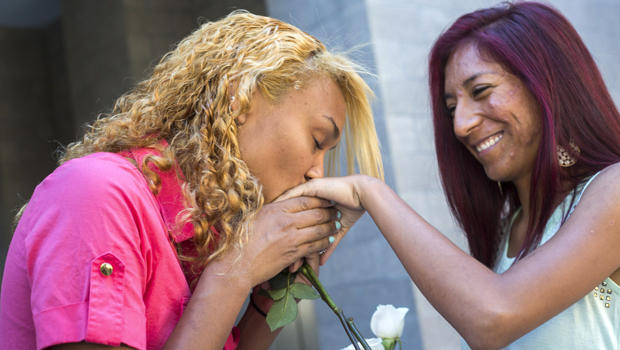Same-sex marriage heading for Supreme Court again
CINCINNATI -- A month after the U.S. Supreme Court declined to rule on same-sex marriage, the issue is headed its way again.
A federal appeals court Thursday halted a run of rulings supporting same-sex marriage by the U.S. courts that are the last line for appeals just below the Supreme Court. The 6th U.S. Circuit Court of Appeals panel instead upheld laws against the practice in four states - Ohio, Michigan, Kentucky and Tennessee.
Attorneys for gay plaintiffs say they will ask the Supreme Court to hear their arguments, and the split created Thursday among the federal appeals courts makes it more likely they will agree to this time.
Justice Ruth Bader Ginsburg had explained in a September speech in Minnesota that the lack of a split in the appeals courts made Supreme Court review of the issue unnecessary. But she said "there will be some urgency" if the 6th Circuit allowed same-sex marriage bans to stand.
One month ago Thursday, the Supreme Court turned away appeals from five states seeking to uphold their same-sex marriage bans. That action had the effect of further expanding same-sex marriage.
The 6th Circuit panel, in its 2-1 ruling, said changing the definition of marriage should be done through the political process, not by judges and lawyers.
"Surely the people should receive some deference in deciding when the time is ripe to move from one picture of marriage to another," wrote Circuit Judge Jeffrey Sutton, writing for himself and a fellow George W. Bush appointee.
The dissenting judge suggested that Sutton and Judge Deborah Cook might have wanted to push the issue on to the high court.
"Because the correct result is so obvious, one is tempted to speculate that the majority has purposefully taken the contrary position to create the circuit split," Judge Martha Craig Daugherty wrote. The Bill Clinton appointee added that the Supreme Court could put an "end to the uncertainty of status and the interstate chaos that the current discrepancy in state laws threaten."
The ruling ran counter to a remarkably rapid string of victories for the gay rights movement over the past few months that have now made same-sex marriage legal in at least 30 states.
Four other U.S. appeals courts in other regions of the country ruled in recent months that states cannot ban same-sex matrimony.
"This anomalous ruling won't stand the test of time or appeal," said Evan Wolfson, president of the pro-gay marriage group Freedom to Marry, in a statement about the 6th Circuit ruling.
Ohio Attorney General Mike DeWine's office, which argued in support of the voter-passed 2004 Ohio ban on same-sex marriage, said it was "pleased the court agreed with our arguments that important issues such as these should be determined through the democratic process."
The question now is timing.
Generally, the court would have to decide by mid-January whether to hear the case in time for a decision in June. Otherwise, the case would be pushed back to the following term and probably not decided until June 2016.
The ruling followed more than 20 court victories for supporters of same-sex marriage since the Supreme Court struck down part of the federal Defense of Marriage Act last year.
